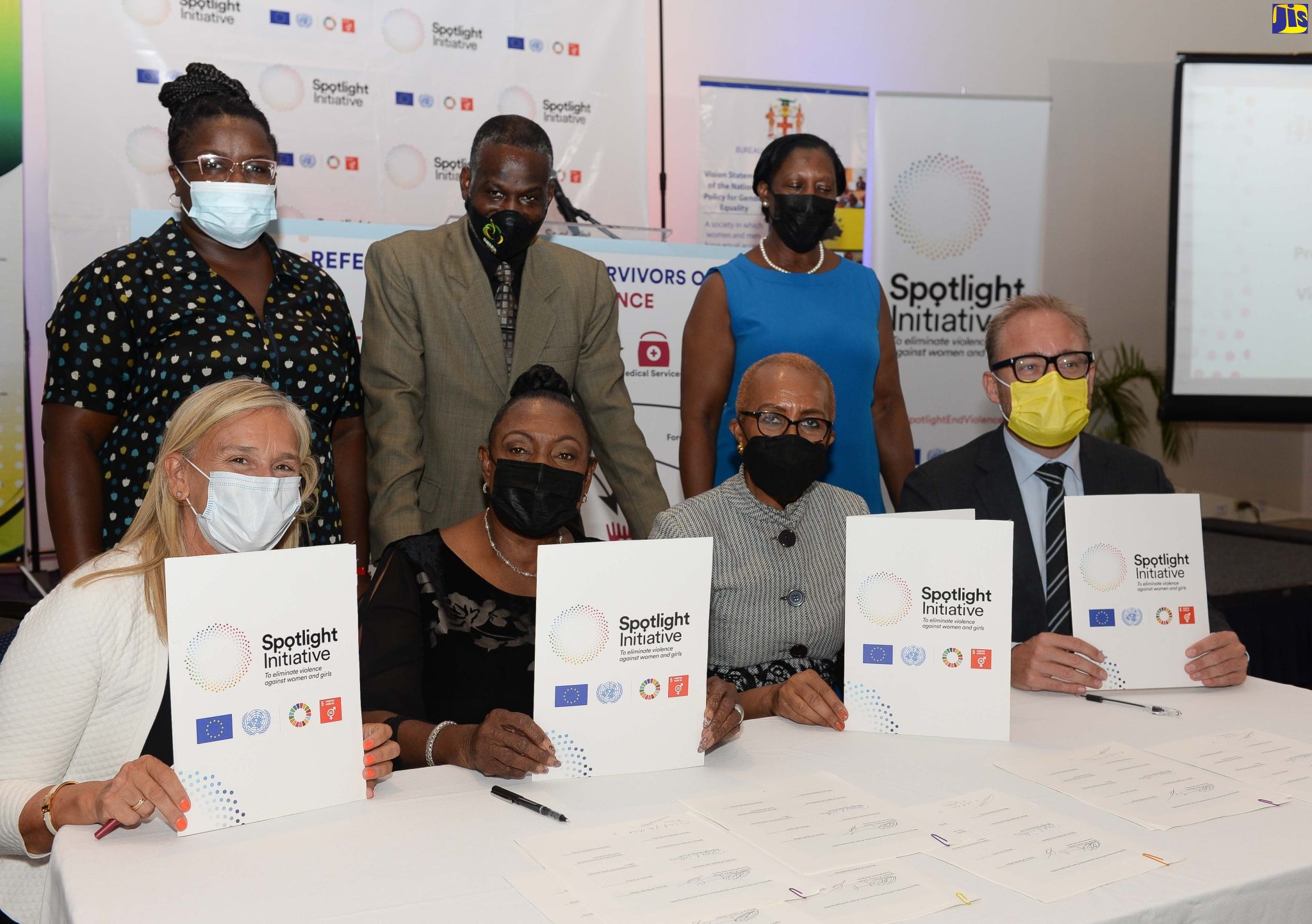A Collaboration To Assist Victims Of GBV
By: , June 24, 2022The Full Story
Several key government agencies are collaborating with international bodies to deliver improved services to victims and survivors of gender-based violence (GBV).
Through the Intersectoral and Interagency Referral and Protocol and Standard Procedures for Continuum Care for Survivors of GBV, the Bureau of Gender Affairs is leading the cooperation to ensure that the service delivery efforts for women and girls is done efficiently.
Lauding the endeavour, Deputy Director of the United Nations Population Fund (UNFPA), Seth Broekman, says it will result in “tangible improvement in the quality of service being provided to survivors”. The pact came out of months of “intense work” with the various groups, he states.
Mr. Broekman who was addressing the recent launch of the programme at the Jamaica Pegasus Hotel in New Kingston, adds that parish level coordinated platforms will be established for the intended beneficiaries. He notes that his agency has facilitated training of 350 members of the Jamaica Constabulary Force (JCF) to provide “appropriate responses in cases of domestic violence”. Also, the Ministry of Health and Wellness now has 16 certified trainers who will be training health providers who work at facilities that serve GBV survivors.
The programme is supported by the Spotlight Initiative, which is a worldwide partnership between the European Union (EU) and the United Nations (UN), to eliminate all forms of violence against women and girls. Jamaica is one of the countries in the Caribbean that is benefiting from the initiative to help women and girls realise their potential in a gender-responsive, inclusive way.
With support from UNFPA and the UN, a set of policy documents for the quality and coordinated intersectoral service delivery to survivors of GBV was developed. This will guarantee them continuum of care and will integrate services from all government agencies for the group.
The policy includes shared knowledge and pre-packaged survivor-centred information on a range of options available to survivors; uninterrupted case management process; integrated intake and management of data, which allows a survivor to move from agency to agency without them having to repeat the process of entering the system.
Minister of Education and Youth, Hon. Fayval Williams, says the collaborative effort is significant for the beneficiates, and her Ministry celebrates the “synergy” between the Ministry of Culture, Gender, Entertainment and Sport and the other groups that have built the partnership for victims of GBV.
Minister Williams stressed that it is a “further push” and commitment of the Government to continue “working to ensure that gender-based violence elimination and response services also take place in the education sector”.
“It is an important milestone that will be critical for how the social service and related entities operate in providing survivor-centred care as children and adolescents receive psychosocial support,” she notes.
Head of the European Union (EU) Delegation to Jamaica, Ambassador Marianne Van Steen, says it was a pleasing moment to “witness the tangible demonstration of the Government of Jamaica, collective commitment to supporting the change required to make strategic gain in the fight against gender-based violence”.
Minister of Culture, Gender, Entertainment and Sport, Hon. Olivia Grange, says with the various groups coming together, it will “strengthen our accountability as a government, as well as provide support to citizens to monitor our progress in responding to gender-based violence”.
Through the partnership, Minister Grange said her Ministry, through the Bureau of Gender Affairs, is delivering improved access to “trauma-informed and survivor services,” as part of a number of provisions being made available in their “Continuum of Care” policy.
UN Resident Coordinator, Dr. Garry Conille, says it is vital that essential services are provided to victims of GBV, and his team is helping Jamaica to build a society where women and girls “who experienced violence, have unhindered access to quality support” for their recovery.
“We are confident that this partnership will strengthen the ability of all stakeholders to protect women and girls in Jamaica,” the UN official says in his address. A Memorandum of Understanding (MOU) was signed between the partners, committing them to work for the objective of eliminating GBV.
Permanent Secretary in the Ministry of Culture, Gender, Entertainment and Sport, Denzil Thorpe, expressed gratitude that the partners have come together in a “shared understanding” of eliminating violence in a sustained and collaborative approach.
“This is a complex, cross-cutting issue, and tackling these issues requires intense effort at multidimensional levels. At the mental level, we must combat attitudes and norms which consider abusing another human being as norm, or as acceptable. At the institution level, we must ensure that our policies and legal frameworks facilitate timely support and redress for survivors,” he tells the group.
Director of the National Shelter Programme, Dr. Tamika Peart, says the objective of the multi-group partnership is to promote a “more seamless interface” among state service providers, as they try to support GBV victims and survivors “wherever they are”.
The UNFPA in collaboration with the Bureau of Gender Affairs Jamaica, is spearheading the coordination of the initiative. The overall objective of the activity is to support the establishment and operationalisation of a referral pathway and a coordination platform among government and other service providers, for victims of GBV.


